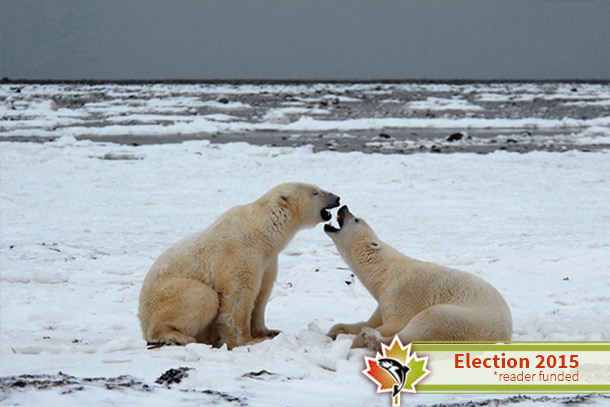This summer, Prime Minister Stephen Harper will embark on his tenth annual tour of the Arctic. There will be boots on the ground, military jets flying overhead, and very likely, photos of Harper sitting in a boat with Parks Canada divers continuing their investigation into two Franklin expedition ships that were lost in the Arctic for more than 170 years.
Considering this tour will be just weeks in advance of a federal election, Harper will try and drive home the message that it is his Conservative government -- not a Liberal or NDP government -- that will truly act in the interests of northerners and those of many southerners who are concerned about the fate of the Arctic.
While it's worked in the past -- the Conservatives won in the Yukon and Nunavut, and finished second in the Western Arctic (Northwest Territories) in 2011 -- Harper's message might not wash this time around.
There is a real possibility that Harper's Conservatives could fail to win a seat in the Arctic in 2015.
"A shutout is certainly possible," says Michael Byers, an Arctic expert and Canada Research Chair in Global Politics and International Law at the University of British Columbia.
Critics say Yukon Conservative MP Ryan Leef and Nunavut Tory MP Leona Aglukkaq have both performed poorly. Dennis Bevington, the NDP MP for Western Arctic may have a lock on the N.W.T, if the Justin Trudeau wave doesn't roll into the region.
"Stephen Harper has given many speeches and photo-ops trying to win the three northern seats and then hold two of them,"' Byers adds. "So yes, being shut out would be a repudiation, based largely on the failure to turn words into action."
Byers is not alone in suggesting this. Increasingly, northerners are frustrated with what they perceive as the government's failure to act on a growing number of serious environmental issues. Polar bear numbers are declining, beluga whale sizes are thinning, caribou populations are collapsing and climate change is warming the Arctic twice as fast as any other place in the world.
In addition, the economies of the three territories are sputtering and the future looks grim. In Nunavut, the unemployment rate is close to 14 per cent, the highest in Canada. The population of the Northwest Territories is declining. Investments in mining, the cornerstone of the Yukon economy, have dropped dramatically.
As a region, the Arctic is not likely going to make or break the electoral fortunes of any political party in the election. But it is likely to produce a roadmap to the future that pits sovereignty and security and oil and gas development against food security, environmental protection, housing and educational opportunities that are becoming increasingly important to northerners.
Hefty transfer payments
In theory, the Conservatives should have the advantage going into this Arctic electoral race. Each of their candidates can boast of the billions of dollars that are made in transfer payments to the territories.
The Conservatives' most high profile candidate is Aglukkaq, who is environment minister and past chair of the Arctic Council, a high-level intergovernmental forum that addresses issues faced by the governments of Arctic countries and by the Indigenous people of the Arctic.
Byers says Aglukkaq is especially vulnerable in 2015, citing her poor record on improving living standards.
"There is widespread dissatisfaction with Aglukkaq's performance, both as chair of the Arctic Council and as MP of Nunavut," says Byers.
"Most politicians make promises in campaigns that are difficult or even impossible to achieve. But the distance between rhetoric and reality is particularly large in this case. Aglukkaq made northern economic development her priority. Not much has come of that."
Byers says northern Canadian voters have taken note that other Nordic countries are faring better economically.
"Anyone who travels to Greenland and the northern regions of the Nordic countries is struck by the high standards of living, housing and public services there -- much, much higher than in the Canadian North.
"Northern Canadians are acutely aware of the disparity, and resentful of southern politicians who gloss over these issues in favour of courting southern votes with flashier issues like sovereignty and security."
Meanwhile, Harper's push to streamline oil and gas and mining developments, encourage shipping through the Northwest Passage and soften regulatory oversight is increasingly being challenged on a number of fronts.
In Nunavut, the Inuit of Clyde River were in a Toronto federal court in late April fighting oil and gas exploration plans approved by the National Energy Board, that they say threatens their traditional way of life along the coast of Baffin Island. The three federal court judges reserved their decision in the case.
"Justice is on our side, and we have a compelling argument here," said Nader Hassan, the lawyer representing the Nunavut town of Clyde River in the Toronto court case. "And the people of Clyde River have a compelling argument. For the people of Clyde River, this is about the right to eat," he said, referring to their fear that the seismic testing that is being proposed this summer will frighten off the seals and whales they hunt.
The week before, the Nunavut Planning Commission said "no" to a proposal to ship iron ore through the whale, walrus and polar bear-rich waters of Lancaster Sound in the Northwest Passage.
Around the same time, Inuvialuit in Tuktoyaktuk and the Dene in Tulita in the Northwest Territories were attending public hearings expressing their concerns about offshore oil and gas development in the Beaufort Sea and plans for hydraulic fracturing in the pristine areas of the Sahtu region of the Mackenzie Valley. All this comes months after a Yukon judge upheld plans for 54,000 square kilometres in the territory's Peel River watershed to be protected from oil and gas and mining developments.
Now Aglukkaq has turned over her chairmanship of the Arctic Council to U.S. Secretary of State John Kerry with almost nothing to show for the economic agenda she promised at the start of her two-year term, which ended in April. With an ambitious agenda of their own -- one which will include climate change measures, according to U.S. Ambassador Bruce Heyman -- the Americans are unlikely to do Canada any favours at future Arctic Council meetings, given the fact that Harper has never uttered the words "climate change" on his previous trips to the North.
In the Yukon, the Conservatives could also be in trouble, as Byers suggests. Their candidate, Ryan Leef, narrowly defeated the Liberal incumbent Larry Bagnell in the last election. Bagnell, who held the seat for 10 years, was persuaded to run again by a Liberal constituency that turned out in record numbers recently to pick him to run for the party in 2015.
Jim Butler, the long-time editor of the Whitehorse Star newspaper, says three things worked against Bagnell in the last election: the Green Party, which captured 3,000 votes that would have otherwise gone to the Liberals or the NDP; the Liberal gun registry, which was highly unpopular in the Yukon; and a poll that suggested Bagnell was more than 20 points ahead in the week before the election.
"It's widely believed that many Liberals didn't bother to vote in the last election because they thought Bagnell (who is running again) was too far ahead in the polls to lose," says Butler.
That's not likely to happen again, according to Butler. John Streicker, the Green Party candidate who did so well in the last election, is not running this time. Frank de Jong, who replaces him, faces an uphill battle both as a new Yukoner, and as someone who lives far outside of Whitehorse where CBC, the Whitehorse Star, Yukon News and other media are located.
NDP strong in NWT
In the Northwest Territories, most observers believe it's going to take a very strong candidate to defeat NDP Dennis Bevington, an environmentalist and businessman who will likely be the beneficiary of increasing concerns about fracking in the Mackenzie Valley, offshore oil and gas development proposals in the Beaufort Sea and the weakening of environmental oversights.
Bevington handily won the election in 2011, easily defeating star candidates such as Joe Handley, the former premier of the N.W.T. and Sandy Lee, a former N.W.T. cabinet minister who won her territorial seat in 2003 by a landslide 80 per cent of the votes. Bevington has not yet announced his intent to run.
Former N.W.T. premier Floyd Roland recently announced that he will seek the Conservative nomination. Roland wasn't the most popular premier, but he could benefit if the Liberals and NDP split the vote.
The big unknown in the N.W.T. and Nunavut is Justin Trudeau, who has been drawing impressive crowds everywhere he goes in the North. Even in the dead of winter in January of 2015, people came out to see and be photographed with him on a trip that he described as "personal" rather than "political."
Trudeau, however, has a problem in Nunavut and the western Arctic. So far, no star candidates capable of defeating Bevington and Aglukkaq have stepped forward, although Michel Potvin, Nunavut's party president, suggests several "very promising" individuals have been short-listed for the job. The prospects for the Liberals in the western Arctic will also look better if former N.W.T. cabinet minister Michael McLeod runs in the next election, as some people think.
The other thing going against Harper's Conservatives is his preoccupation with sovereignty and security, which have never resonated with northerners. Harper's "use it or lose it" mantra was designed largely for a southern audience that has been duped into thinking that Canada's ownership of the Arctic is in peril.
Terry Audla, president of Inuit Tapiriit Kanatami, which is the voice of the Inuit of Canada, refused to comment on potential election issues at a recent Canadian Climate Forum in Ottawa. Security and sovereignty, however, didn't play into his powerful presentation. Audla was more concerned about jobs, income security, training, education, better health care, housing and other benefits that are in short supply in the Arctic. He used the words "climate change" 22 times.
Audla insisted that the Inuit are not opposed to oil and gas development, but he emphasized that his people would not support activities that may have a damaging impact on wildlife and the environment.
"Climate change is impacting migration patterns, human access to wildlife, altering Inuit traditional travel routes and impacting Inuit consumption patterns, food preparation methods and food storage," he said. ![]()
Read more: Federal Politics, Election 2015, Environment
















Tyee Commenting Guidelines
Comments that violate guidelines risk being deleted, and violations may result in a temporary or permanent user ban. Maintain the spirit of good conversation to stay in the discussion.
*Please note The Tyee is not a forum for spreading misinformation about COVID-19, denying its existence or minimizing its risk to public health.
Do:
Do not: